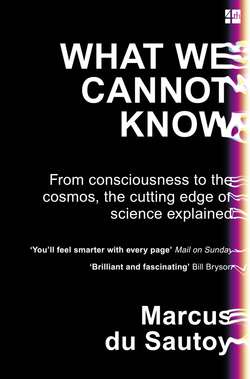Читать книгу What We Cannot Know: Explorations at the Edge of Knowledge - Marcus Sautoy du - Страница 31
THE HUMAN EQUATION
ОглавлениеSo what are the big open questions of science that May would like to know the answer to? Consciousness? An infinite universe?
‘I think I’d look at it in a less grand way, so I’d look at it more in terms of the things I am working on at the moment. Largely by accident I’ve been drawn into questions about banking.’
That was a surprise. The question of creating a stable banking system seemed very parochial, but May has recently been applying his models of the spread of infectious diseases and the dynamics of ecological food webs to understanding the banking crisis of 2008. Working with Andrew Haldane at the Bank of England, he has been considering the financial network as if it were an ecosystem. Their research has revealed how financial instruments intended to optimize returns to individual institutions with seemingly minimal risk can nonetheless cause instability in the system as a whole.
May believes that the problem isn’t necessarily the mechanics of the market itself. It’s the way small things in the market are amplified and perverted by the way humans interact with them. For him the most worrying thing about the banking mess is getting a better handle on this contagious spreading of worry.
‘The challenge is: how do you put human behaviour into the model? I don’t think human psychology is mathematizable. Here we are throwing dice with our future. But if you’re trying to predict the throw of the dice then you want to know the circumstance of who owns the dice.’
That was something I hadn’t taken into account in my attempts to predict the outcome of my casino dice. Perhaps I need to factor in who sold me my dice in the first place.
‘I think many of the major problems facing society are outside the realm of science and mathematics. It’s the behavioural sciences that are the ones we are going to have to depend on to save us.’
Looking round the canteen at the House of Lords, you could see the sheer range and complexity of human behaviour at work. It makes the challenge of mathematizing even the interactions in this tiny microcosm of the human population nigh impossible. As the French historian Fernand Braudel explained in a lecture on history he gave to his fellow inmates in a German prison camp near Lübeck during the Second World War: ‘An incredible number of dice, always rolling, dominate and determine each individual existence.’ Although each individual dice is unpredictable, there are still patterns that emerge in the long-range behaviour of many throws of the dice. In Braudel’s view this is what makes the study of history possible. ‘History is indeed “a poor little conjectural science” when it selects individuals as its objects … but much more rational in its procedure and results when it examines groups and repetitions.’
But May believes that understanding the history and origins of the collection of dice that make up the whole human race is not as straightforward as Braudel makes out. For example, it’s not at all clear that we can unpick how we got to this point in our evolutionary journey.
‘I’ll tell you one of the questions that I think is a particularly interesting one: trying to understand our evolutionary trajectory as humans on our planet. Is the trajectory we seem to be on what happens on all or most planets, or is it the result of earlier fluctuations in the chaos which took us on this trajectory rather than another. Will we ever know enough to be able to ask whether the disaster we seem to be heading for is inevitable or whether there are lots of other planets where people are more like Mr Spock, less emotional, less colourful, but much more detached and analytical.’
Until we discover other inhabited planets and can study their trajectories, it’s difficult to assess whether evolution inevitably leads to mismanaged ecosystems based on just one dataset called Earth.
‘The question of whether where we’re heading is something that happens to all inhabited planets or whether there are other planets where it doesn’t happen is something I think we’ll never know.’
And with that May polished off the last few crumbs of his chocolate cake and plunged back into the chaos of the select committees and petty politics of Westminster.
May’s last point relates to the challenge that chaos theory poses for knowing something about the past as much as the future. At least with the future we can wait and see what the outcome of chaotic equations produces. But trying to work backwards and understand what state our planet was in to produce the present is equally if not more challenging. The past even more than the future is probably something we can never truly know.
